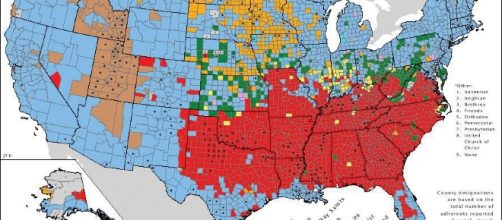Religion in America when I began a career as a religion journalist in 1960 was like night and day compared to now. Back then the dominant churches were those of denominational Protestantism -- Methodists, Presbyterians, Episcopalians and so forth..
Mainline Protestantism had identifiable leaders like Eugene Carson Blake, Jr. and Bishop James Pike. Churches were coming to grips with urbanization. Roman Catholics were being prodded toward progress by Pope John XXIII. There was interreligious dialog and overshadowing everything the civil rights movement.
Decline and more
The collapse of this edifice was not long in coming. By the close of the 1960s, mainline Protestantism was in what appears to be permanent decline. The death of Dr. Martin Luther King was devastating. The Vietnam war protests fuelled a general revolt against progressives which polarized and transformed the country. We went from the Smothers Brothers to All in The Family.
Judges Weigh Trump’s ‘Muslim Ban’ Remarks at Appeals Court Hearing https://t.co/datMgY0vsA
— Stephen C. Rose (@stephencrose) May 9, 2017
It was the debut of the long-smoldering neoliberal era, a conservative political takeover of the country, following the election of Nixon in 1968. It is still in progress. The hopes of achieving a non-violent and peaceful way of living gave way to an ever more raucous, ever more divided, ever more drug and debt-ridden society.
Mainline
One reason for the gradual collapse of the mainline churches, my main concern as a reporter back then, was the failure to forge a powerful response to the fundamentalism that is the most evident expression of Christianity today. Most churches today are Biblical and creedal. Efforts to widen dialog and create a more visible universality among religions have not been pronounced.
Spirituality
There is a great deal of individual interest in spiritual growth and some of the remnants of the mainline have moved in this direction. Elements of this development contrast with the traditional religions in having neither creeds nor a text nor faith that they can easily articulate. They do not say they are "saved".
They may meditate and even share community with others. But it is largely unspoken and personal. This does not mean they are not engaged in the world. They tend to be more liberal and global in their outlook than their evangelical kin.
I have avoided the vital and highly devotional faith of Islam in this article because I do not have knowledge of its inner working. My Muslim friends appear to me to be considerably more disciplined and oriented to the practice of their faith than Christians I know in the mainline churches.
My sense is that the death of mainline Protestantism has causes that transcend mere attrition and lack of an alternative to fundamentalism. I think all religious authority is terminal.
I see the rise of fundamentally idolatrous movements, worshipping a nation, an idea or even a person, I see a growth in spirituality that is ecumenical in the widest sense, celebrating diversity and attuned to the cyber-reality in which we live.
This century will tell whether the peaceful vision has a chance in the sort of environment that now exists. The story which is noted in the tweet above is indicative of the sort of change that has taken place. trump is known for his attack on Muslims and Islam. The notion that we would have a president who might lure a fundamentalist base into a religious way is a measure of our descent.


